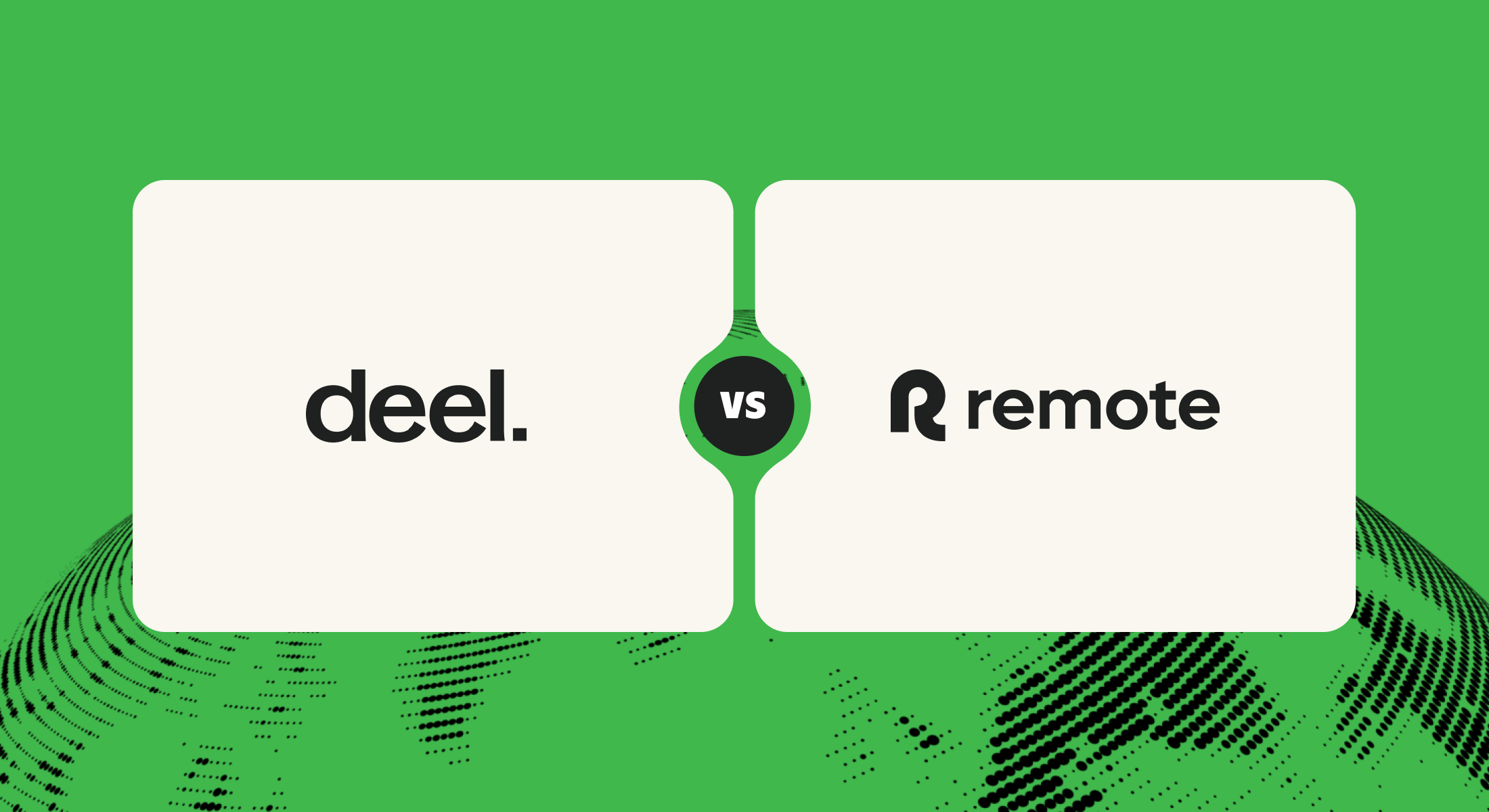An Employer of Record (EOR) helps you hire, pay, onboard, and manage international employees without setting up local entities.
However, not all EOR services are transparent about pricing, support, and other key factors, which can sometimes lead to costly and time-consuming legal compliance and HR missteps.
Careful vetting and awareness of common red flags can help you choose a reliable and trustworthy EOR partner.
Key takeaways:
- Request clear, itemized pricing to avoid hidden or unclear fees, such as onboarding, termination, or currency conversion costs.
- Compliance is crucial, as errors in payroll, tax filings, or contracts can result in legal penalties.
- Look for transparency: read reviews, request references, and ask questions about coverage, support, and data security before signing.
1. Hidden Fees That Inflate Your Costs
An EOR takes operational tasks off your plate; it shouldn’t add to your anxiety.
Finding a partner within your HR budget means assessing both recurring costs and potential hidden fees that could create unexpected financial pressure.
Onboarding Fees That Don’t Add Up
Some EORs charge a per-employee onboarding or setup fee. This may seem minor initially, but it will quickly add up as you scale your global team.
Typically, transparent EORs roll onboarding into the monthly base cost, since it’s part of end-to-end employment support.
But, confirm this by specifically asking whether your quote includes onboarding services or whether you’ll be billed separately for that step in the hiring process.
Surprise Monthly or Currency Conversion Fees
Some EORs add currency conversion markups or hidden administrative fees to their base rate, which inflates your total costs, especially as your team grows.
Avoid these by requesting transparent pricing outlining currency conversion rates, benefits administration costs, and third-party service markups.
Generally, trustworthy EORs offer transparent, all-inclusive monthly pricing per employee and maintain clear communication throughout the partnership. You should never be surprised by your bill at the end of the month.
Termination Fees That Catch You Off Guard
Some EORs add additional termination or transition fees on top of the mandatory severance you may be required to pay by local labor law. This can make it costly to end contracts or transition employees.
Review employee termination terms before signing. Notice periods, severance, and end-of-employment costs should be clearly stated (and you should ask questions if the terms are vague or overly complex).
Reliable EORs prioritize both compliance and flexibility, ensuring a smooth offboarding process without unnecessary costs or legal risk.
2. When Low Pricing Isn’t Always a Good Thing
Here’s the thing — selecting a partner based on low pricing alone can come back to bite you in terms of higher costs down the road, strained relationships, and even legal issues.
However, this doesn’t mean all low-cost providers are disreputable. For example, at RemoFirst, we’re proud to offer some of the most affordable and radically transparent pricing on the market, with no hidden fees.
But transparency and due diligence are key. Do your homework and ask questions to understand an EOR’s country coverage, service variety, dedicated support, and more, to ensure affordable prices don't mean limited service or poor support.
If It Sounds Too Good to Be True, It Might Be
Extremely low monthly rates can (but not always) point to reduced services, like shaky compliance coverage, limited support, or risky shortcuts.
An EOR with low upfront fees can quickly become the most expensive option if issues like this surface. Cutting corners can turn into payroll errors, contract disputes, or noncompliance with local labor laws, resulting in steep fines and legal penalties later.
Always ask for a pricing breakdown and an explanation of how the EOR can reduce costs. In the case of RemoFirst, it’s partially tied to the fact that we operate under a partner model rather than the more costly practice of maintaining legal entities in every country where we operate.
Hidden Tradeoffs Behind Low Costs
However, sometimes ultra-low pricing does signal hidden tradeoffs. For example, some low-cost providers only operate in select regions, forcing companies to work with multiple vendors to cover their multi-location team.
Extremely cheap pricing can also mean lean account management, outdated tools or workflows (e.g., slower services or response times), or limited local expertise, leaving clients responsible for resolving compliance or HR issues on their own.
Critical services, like benefits administration, visa sponsorship, or local tax filings, might be missing altogether or outsourced to third parties.
Again, lower pricing doesn't always mean these issues exist, as with RemoFirst. But it's something to be aware of when doing your research.
Before signing an EOR contract, request a detailed scope of services to confirm what's included (and what's not) in the base rate, including benefits, support levels, and compliance coverage per country.
3. Compliance and Legal Risks You Shouldn’t Overlook
Compliance errors are among the most expensive risks when working with an EOR. Local employment laws, tax requirements, and mandatory benefits vary widely by country — and even small mistakes can lead to fines, payroll disputes, or reputational damage.
When evaluating vendors, it’s essential to understand how a potential EOR partner keeps up with compliance and changing regulations across different countries.
Weak Local Compliance Knowledge
Each country operates under unique employment and tax frameworks. An EOR helps you avoid making HR mistakes related to payroll, benefits, or contract law that could trigger legal investigations and financial liabilities.
Laws change over time, due to legal stipulations, cultural expectations, or industry trends. To stay current on any changes, most dependable EORs maintain close relationships with in-country experts or partners, who understand the ins and outs of the laws in that region and guarantee ongoing compliance.
Owning an entity in a particular location isn’t enough; your EOR partner should have experience, oversight, and accountability in every market they support.
Vague or Incomplete Contracts
Unclear or overly simplistic contracts can make it hard to understand your legal obligations, increasing the risk that key responsibilities slip through the cracks.
Protect your company by ensuring the agreement clearly outlines who owns payroll, manages taxes, and administers benefits.
It should also define each party’s responsibilities for employment protections, data handling, dispute resolution, and termination to prevent misunderstandings, legal exposure, and gaps in support.
4. Service and Support Red Flags
Your EOR partner should simplify day-to-day HR management while providing fast support and issue resolution, allowing your team to focus on strategic, big-picture initiatives.
Questionable Onboarding and Offboarding Processes
A new hire’s onboarding process forms their first impression of your organization — and a negative impression is hard to break.
Slow or confusing onboarding frustrates new hires. Disorganized setup steps, late equipment, or unclear paperwork can delay start dates and damage your employee’s experience.
Similarly, if your company mishandles an employee’s offboarding experience, you risk them leaving your company with a negative impression. This might lead to negative reviews on corporate review websites, like Glassdoor, which could impact your candidate pool in the future.
Even worse, offboarding missteps, like missing paperwork, unpaid benefits, or poor record-keeping, can expose your company to legal, compliance, and payroll risks.
A reliable EOR streamlines both practices. They should provide clear timelines and step-by-step processes for how onboarding and offboarding are handled in the country where you’re hiring, so your company and all team members are on the same page.
Poor Customer Support or Delayed Response Times
A reliable EOR is communicative, proactive, and quick to respond to questions or issues.
Slow support could turn into payroll errors, visa delays, or compliance issues. It could cost you a vital new hire or business deal when administrative needs are unmet.
Unresponsive support also undermines trust. Delayed or generic replies create operational bottlenecks and stress for employees, who rely on timely guidance.
Seek a provider offering responsive, knowledgeable support with dedicated account managers and 24/5 communication channels at a minimum.
And don’t just take the vendor’s word for it: ask about escalation paths and average response times. A mature EOR will measure and publish service performance metrics or be able to provide a complete response to service resolution.
No Self-Serve Tools or Visibility
Your teams need quick, reliable access to the information that keeps operations running — from employee records to contracts and invoices. Without it, HR and finance can’t move fast, confirm accuracy, or make informed decisions.
Modern EORs solve this with secure self-serve platforms and intuitive dashboards that let you view data, generate reports, and track employee changes in real time. These tools streamline payroll, contracts, and benefits management — all in one place — so you don’t have to rely on service requests or wait for responses.
Limited Global Coverage
Some “global” EOR providers may only have entities or partners in a limited number of countries.
Popular providers, such as Deel and Remote, rely predominantly on their own entities to support workers in particular regions, which can limit flexibility in locations where they’re not yet established.
RemoFirst offers a better, flexible, and more scalable solution by tapping into a vast partner network. Our partner EOR model enables competitive pricing compared to competitors and the ability to scale your business faster, without sacrificing compliance or service quality.
Look for an EOR capable of supporting new markets quickly, with the same level of compliance and service quality across regions. Verify coverage by asking the countries your provider actively supports today, and how easily they can expand as your international hiring needs grow.
5. Data Protection and Security Concerns
Your EOR partner must offer stringent control and protection of business and employee data and follow all required security regulations, like GDPR.
Weak Data Security Practices
Global employment involves storing and managing highly sensitive data. Companies must protect payroll, identification, tax, and benefits information with strict security and access controls.
These protections must also extend to the business data your employees handle, particularly if they’re located in regions with strict compliance frameworks.
A single data breach or mishandled record could result in regulatory penalties, substantial reputational damage, and loss of employee trust.
Ask specific questions about security protocols. Confirm how your provider encrypts, stores, accesses, and transfers data, especially across borders and between partner entities.
Reputable EORs can explain data protection measures and will use secure, compliant systems for document exchange and record management.
No Clear Privacy or Compliance Certifications
Ask EORs you’re vetting to share clear, documented data-handling policies and security requirements. They should have privacy certifications and be willing to share past compliance audits.
The best EORs will follow globally recognized frameworks (like GDPR, ISO 27001, or SOC 2), demonstrating a commitment to thorough information security and compliance oversight.
Additionally, confirm the EOR’s compliance coverage in every country where you manage workers, to ensure regional coverage.
Read Reviews and Ask for References
There are plentiful resources available to vet EORs before committing to a partner.
Check independent review websites to read feedback and reviews. If you see multiple mentions of poor communication, billing surprises, or compliance issues on review sites, take these red flags seriously to save yourself from future headaches.
Review testimonials or case studies to help you understand the partnership in greater detail and hear other clients’ experiences.
Ask for and follow up on references. These conversations should highlight both the good and the bad, so you understand how the EOR has handled real-life challenges and resolved issues.
A request for references will also reveal how transparent and trustworthy the EOR is. If they fail to provide reliable and recent references, that’s cause for concern.
Why Companies Choose RemoFirst
RemoFirst makes it easy for businesses to hire employees in 185+ countries and contractors in 150+, without the headaches of establishing local entities or navigating complex labor laws.
Our trusted partner model allows us to deliver one of the most cost-effective EOR solutions in the industry — without hidden fees, service gaps, or compromises in quality.
You get the same personalized support, speed, and compliance expertise that larger providers promise, but at a fraction of the cost.
Schedule a demo to see how simple global hiring can be with the right EOR partner.




















